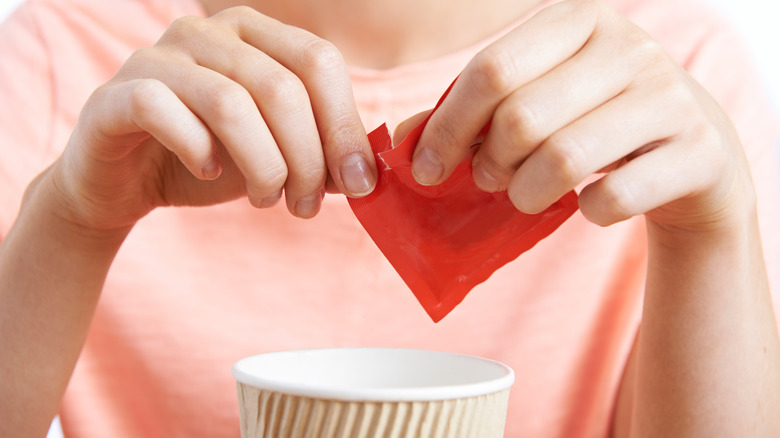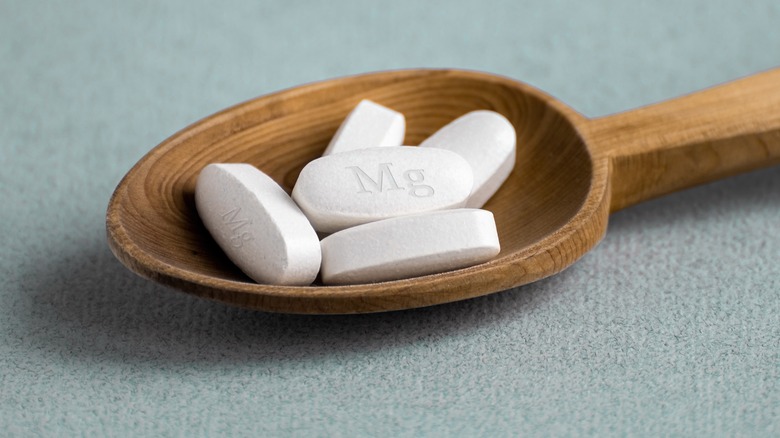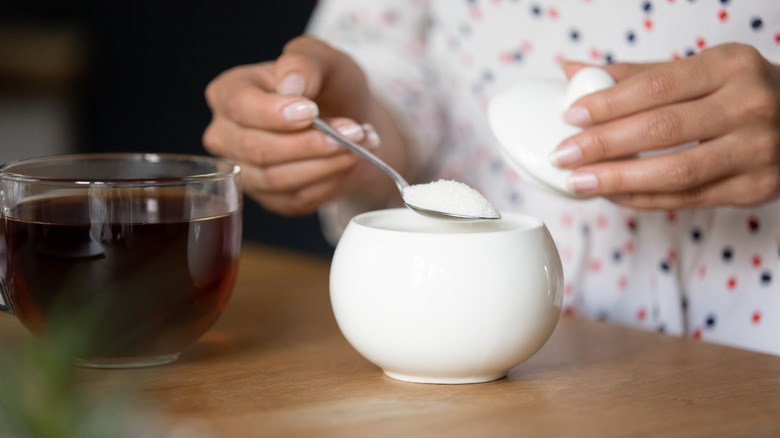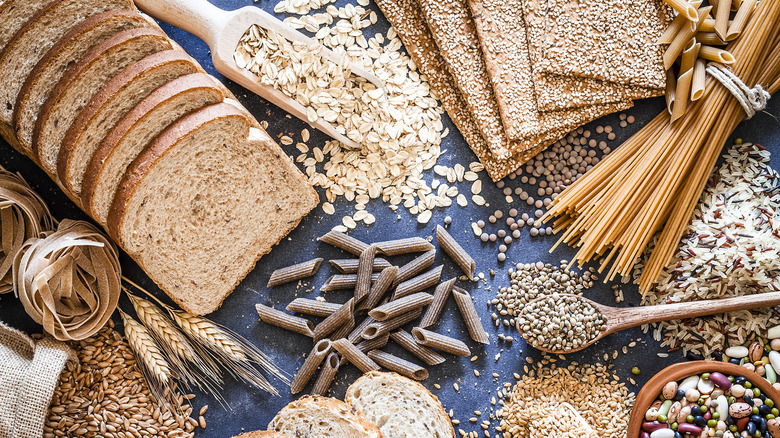Our Nutrition Experts Uncover Food Label Red Flags That Are Hiding In Plain Sight
We all want to be in good health and take care of our bodies the best we can. However, that is often easier said than done. A 2023 study in the Journal of the Academy of Nutrition and Dietetics revealed that 60% of the food Americans eat contains technical food additives, preservatives, flavoring agents, and artificial sweeteners. The study also found that the number of additives in food and beverage products has been increasing over the years: In 2001, the number was 3.7, but by 2019, it had increased to 4.5.
The problem is not strictly an American one, either. A 2020 study published in Scientific Reports showed that, in France, more than 50% of food products contained at least one additive, and more than 11% contained at least five. All told, more than 85% of total food items, from artificially sweetened beverages to cakes and ice cream, contained some form of additive. Because of this, it's good for you to know what's hiding in your food. We consulted a few experts to share with you some of the ingredients you need to be on the lookout for when you're shopping.
Artificial sweeteners
Sugary snacks and drinks are everywhere, from cookies to cola. But these tasty treats are loaded with sugar substitutes that can have adverse effects on your health. According to a 2014 study published in Nature, mice who had such sweeteners as saccharin, aspartame, and sucralose added to their diets experienced intestinal bacteria alterations and glucose intolerance. Glucose intolerance can be a precursor to type 2 diabetes. Human subjects in the study also demonstrated similar results. WebMD also reports that aspartame has been linked to a wide range of health problems, including skin problems, early menstruation, mood swings, and liver damage.
"Artificial sweeteners provide sweetness with no energy for the body, thereby causing an effect on the body that actually stimulates appetite," says Stephanie Olton, a holistic nutritionist and wellness guide. "They also have an inflammatory effect , which can lead to bodily imbalance and disease. Aspartame has been linked to liver cancers, dermatitis, early menstruation, and moodiness and depression."
Food dye Red 40
Red 40 is a food dye, one of nine, that has been approved for human consumption by the U.S. Food and Drug Administration (via WebMD). Everything from cookies to cake frosting and soft drinks can be given an eye-catching color change thanks to the addition of Red 40 and other food dyes. But that pop of color may come at a price. A 2021 report published by the state of California revealed that children who consume foods with dyes, including Red 40, have experienced neurobehavioral side effects, including hyperactivity. It has also been connected to a wide range of other troubling health issues, according to experts.
"Red 40 has been linked to ADHD, depression, anxiety, skin irritations, asthma, migraines, and even some cancers," says Stephanie Olton. "Red Dye 40 contains benzene, which is a known cancer-causing substance. It's harmful enough to be banned by countries like Norway, France, the UK, Finland, and other countries across Europe. Other food dyes, like Yellow 5 and Yellow 6 have also been linked to certain cancers."
Magnesium stearate
Magnesium stearate is an additive that is found in pharmaceutical capsules and tablets, as well as baking ingredients, spices, and hard candies (via Toxicology Reports). According to Healthline, the powdery substance that you find on your pills is magnesium stearate, and its primary design is to act as a lubricant. It keeps pills from sticking together and also prevents them from breaking down in the body until the right time. For the most part, experts say that magnesium is safe to consume.
That said, consuming too much can irritate the lining of the bowel and lead to a laxative effect. WebMD also notes that consuming magnesium stearate can lead to the creation of biofilms, protective barriers formed by bacteria in the digestive system. "Studies show that it may keep the body from absorbing nutrients and can potentially slow down our enzymes," according to Stephanie Olton. "These side effects can slow metabolism and create nutritional deficiencies."
Potassium sorbate
The primary purpose of potassium sorbate is as a preservative, prolonging a food product's shelf life (via Healthline). In general, it's considered safe to consume by the FDA, but there are some studies that have shown that potassium sorbate can have an impact on gut health. A 2024 study published in Food and Chemical Toxicology showed that potassium sorbate consumption over the course of ten weeks led to inflammation in the liver and alterations in gut microbiota. However, after abstaining from potassium sorbate-rich foods for five weeks, the body returned to normal. These effects could possibly be due to the fact that potassium sorbate may inhibit the growth of Enterococcus faecalis, in the gut microbiome (via the Society for Integrative and Comparative Microbiology).
"[Potassium sorbate] is a food additive that causes inflammation in the gut, resulting in an allergic response and potentially skin irritations," Stephanie Olton explains. Its intended use is to inhibit molds or yeasts in many fast food restaurants (McDonald's, for example) and processed goods. Long term consumption can lead to nausea, vomiting and diarrhea."
More than 5 grams of added sugars
Excess sugar in food can be a major problem because once the body has used the sugar that it needs for energy, the remainder goes to the liver to be stored as fat (via MD Anderson Cancer Center). Having excess sugar in the diet can lead to a slew of health issues, including metabolic syndrome, obesity, and type 2 diabetes. In addition, a 2023 study published in the Journal of Alzheimer's Disease revealed that too much excess sugar in the diet could potentially double the risk of dementia.
"The recommended daily max for added sugars is 50 grams, so you want to look for foods with less than 5 grams per serving, which will show up on the label as 10% of the Daily Value (daily max)," according to Maggie Moon, MS, RD, brain health nutrition specialist and author of "The MIND Diet." "For sweet treats, consider staying below 10 grams per serving, which is 20% of the Daily Value. For heart health, you may want to stay under 25 grams per day for women and 36 grams per day for men, which is what the American Heart Association recommends."
More than 10% Daily Value for saturated fat
Saturated fats, like trans fats, are one of the unhealthy fats present in your food. According to MedlinePlus, too much saturated fat in your diet can cause a host of health problems, including weight gain and heart disease. The American Heart Association says that, for a 2,000-calorie-per-day diet, only around 120 of them should be made up of saturated fats.
"The Daily Value is a short-cut for people to see how much of a nutrient they are getting compared to recommendations," says Maggie Moon. "For nutrients we want to limit, we should be looking for the Daily Value to be no more than 10% for most foods, and 25% max for larger portions like meals. Most foods with natural fats have a mix of saturated and unsaturated fats, even something like olive oil that's well-known for its healthy fats. It's all about balance. For saturated fat, don't worry about small amounts and focus on making most of your fats unsaturated from foods like seafood, nuts, seeds, and avocados."
Multigrain products without whole grains
Whole grains may have a number of health benefits, according to Healthline. They have been linked to everything from weight loss to heart health to a reduced risk of colon cancer. However, refined grains have had many of the nutrients stripped out of them and, as a result, do not have the same health benefits. Based on the findings of a 2013 study published in Public Health Nutrition, many products listed as "multigrain" are not clear which of those grains are whole versus refined.
"Technically, multigrain products may have multiple grains in them, but they can be mostly refined grains," Maggie Moon states. "It's not always the case, of course, but the best way to confirm if you're getting healthy whole grains — or not — is to check the first few ingredients, which are listed in order of prominence. Another sign a multigrain product may not be living up to its hype is to check the fiber content. Look for 3 grams or more per serving."
Hidden allergens
Allergic reactions to food can be severe and, in some cases, life threatening (via Banner Health). People who suffer from food allergies can experience itching, swelling, vomiting, and, in extreme situations, difficulty breathing and anaphylaxis. In most cases, people with food allergies know what to avoid in order to prevent an allergic reaction. Foods like eggs, milk, peanuts, and shellfish tend to have allergens that can trigger a reaction in certain people.
However, food products can have hidden allergens that can cause problems. According to a 2023 study published in Nutrients, more than 22% of food-related allergic reactions in people older than 14 were due to hidden allergens. Banner Health notes that it comes down to reading the label carefully and looking for products such as ghee, lactose, and arachis oil that could contain harmful allergens. "Properly labeled products compliant with labeling laws should have a separate allergens statement in bold that makes it clear what allergens are in a food," Maggie Moon says. "However, if you're allergic or sensitive to any ingredients, it's a good idea to peruse the ingredient list for yourself to confirm it's safe to eat."
Questionable health claims
Be on the lookout for labels that boast that a particular product is a good source of protein or fiber, heart healthy, or low in calories. While these statements may be (at least partially) true, there could be other unhealthy ingredients lurking inside these products that negate whatever health benefits they may offer (via Healthline). Additionally, food companies may make claims that, while technically accurate, don't tell the whole story. For example, the Federal Trade Commission reported a case in which Kellogg's claimed that Frosted Mini-Wheats were proven to increase children's attentiveness by 20%. However, Food Dive noted that the company was basing these results on kids who had eaten Mini-Wheats for breakfast versus just having water.
"At best," explains Maggie Moon, "you may be missing out on healthy foods that decided not to put any claims on their packaging; at worst, the claims may be misleading because they don't give you the full picture of what's in the food. When comparison shopping, the most even playing field is the nutrition label and ingredients statement, which are held to the same standards across foods."









